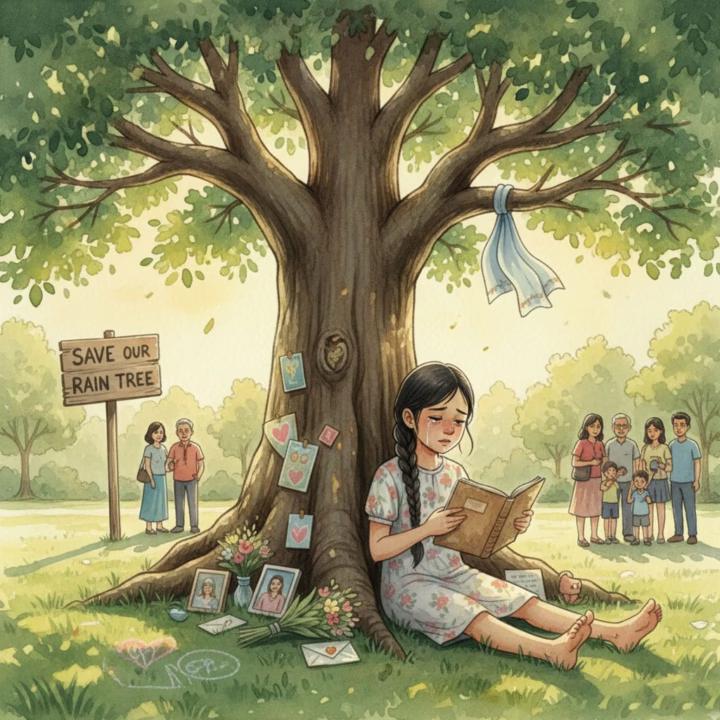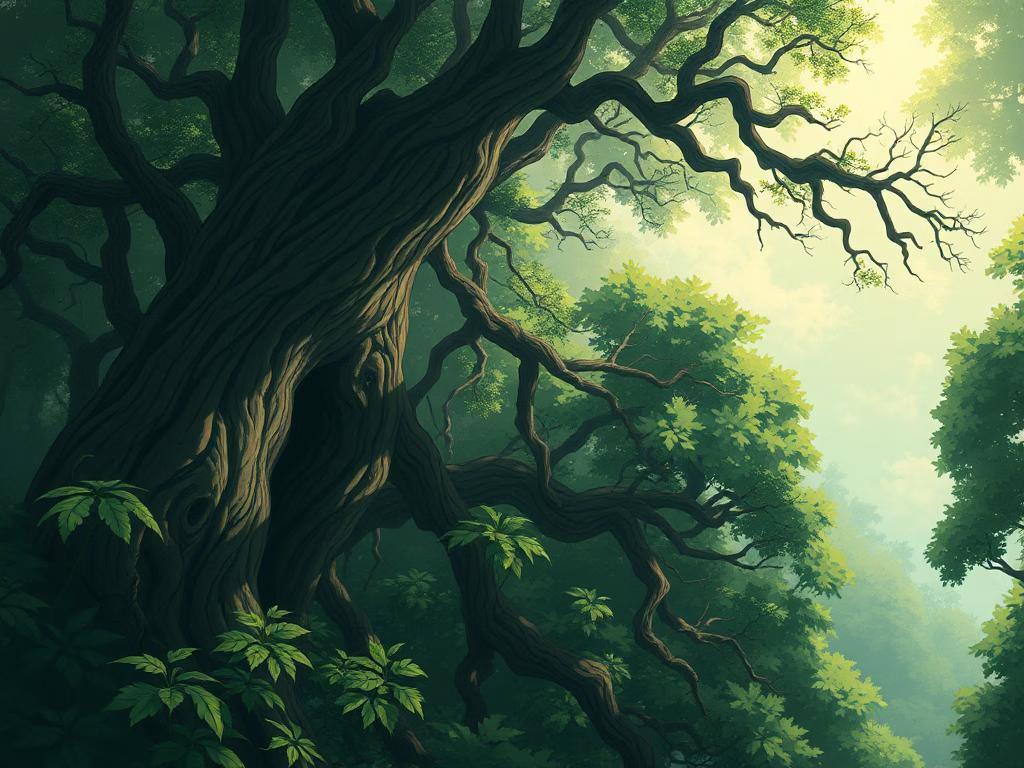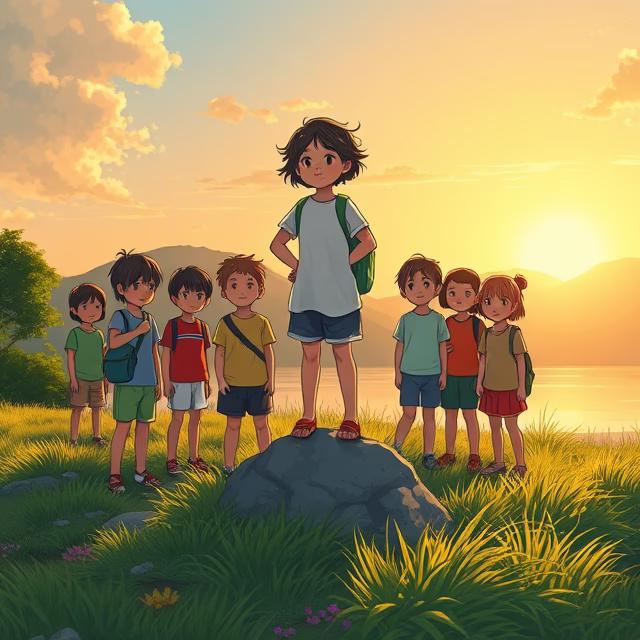
Maya didn’t cry when her father left. Not in front of her mother, not in front of the neighbors who clucked their tongues and said, “Poor thing, so young to be without her papa.” She didn’t even cry when the taxi pulled away, her father’s face fading behind the dusty window like a photograph left too long in the sun.
But that night, when the ceiling fan hummed like a tired bee and the city lights blinked beyond her window, Maya slipped out the back door and walked barefoot across the dew-slick grass to the old rain tree at the edge of the playground.
It stood alone now—once part of a row that lined the path to the old community hall, but the others had been chopped down years ago for wider roads and parking lots. This one had survived, gnarled and wide as three people holding hands, its roots rising from the earth like sleeping crocodiles. Its leaves whispered even when there was no wind.
Maya pressed her palm against its bark.
“I miss him,” she whispered.
The tree didn’t answer. Of course not. But the breeze that rustled through its crown sounded like a sigh. And for the first time since her father left for Singapore, Maya didn’t feel quite so small.
From then on, the rain tree became her confidant.
Every morning before school, she’d run her fingers over the deep grooves in its trunk, telling it about her dreams—how she wanted to be a marine biologist and swim with sea turtles, how she hated math but loved drawing maps of imaginary islands, how her mother worked double shifts at the clinic and came home smelling like antiseptic and exhaustion.
She told it about the new boy in class, Arjun, who had laughed at her drawing of a whale with wings, and how she’d pretended not to care.
She told it about the dreams she had of her father—vivid ones, where he was standing on a beach under a sky full of stars, calling her name.
And every time, the tree listened. Its leaves trembled. Its branches swayed. Sometimes, when the wind was just right, it sounded like it was whispering back.
Then came the notice.
It was taped to the lamppost near the swings: URGENT URBAN DEVELOPMENT NOTICE – TREE REMOVAL FOR SAFETY AND PROGRESS.
Below it, a diagram showed a sleek new convenience store where the rain tree now stood. A little sign said: Coming Soon: QuickMart – Open 24 Hours.
Maya’s stomach dropped.
“No,” she said aloud. “You can’t.”
She ran to the tree and wrapped her arms around its trunk, as if hugging it could make it disappear from the plans. “They can’t cut you down. You’re not just a tree. You’re… you’re mine.”
That night, she lay awake, listening to the silence where the wind used to speak.
The next day at school, she barely heard her teacher. At lunch, she didn’t eat her sandwich. Instead, she pulled out her sketchbook and drew the tree—not just how it looked now, but how it felt: roots deep as secrets, branches cradling memories, its heartwood glowing like old gold.
She added words around it:
This tree remembers.
It remembers laughter. Rain. Songs. Promises.
It remembers what we forget.
Arjun peered over her shoulder. “That’s… actually kind of cool,” he said. “Why are you drawing a tree like it’s a person?”
“Because it is,” Maya said. “It remembers things. I think… I think it remembers my dad.”
Arjun frowned. “Your dad’s in Singapore.”
“I know,” she said softly. “But he used to sit under this tree with me when I was little. He told me stories. He said trees keep watch over us. That they remember everything we say beneath them.”
Arjun was quiet for a moment. Then he said, “Maybe the tree does remember.”
That afternoon, Maya went back to the tree with a plan.
She dug through the old wooden chest in her room—her father’s “memory box”—and found a small, faded blue handkerchief with the initials R.M. stitched in one corner. He used to keep it in his shirt pocket. She remembered him wiping her forehead with it once after she fell off her bike.
She tied it to a low branch.
Then she started writing letters—not to her father, but to the tree.
Dear Rain Tree,
Today I told Arjun about you. He didn’t laugh. Maybe people just need to listen more.
I’m scared they’ll cut you down. But I won’t let them without a fight.
You’re not just wood and leaves. You’re made of time. And love. And all the things we leave behind.
Please don’t go.
She tucked the letter into a crack in the bark.
Over the next week, others began to notice.
Mrs. Lim from Unit 5B, who used to sun-dry her anchovies on a mat beneath the tree, brought a photo of her grandson’s first birthday picnic there. She taped it to the trunk with a paperclip.
Old Mr. Suresh, who walked with a cane, touched the bark and said, “My wife and I used to sit here every evening. She’s gone now. But the tree… it still feels like she’s near.”
A little girl from the flat across the way drew a rainbow with chalk on the roots.
And Maya? She started a petition.
SAVE OUR RAIN TREE
It’s not just a tree. It’s our history. Our heart.
She went door to door. She stood at the bus stop with her sketchbook. She even convinced Arjun to help.
By the end of two weeks, they had 187 signatures.
The day the chainsaw arrived, Maya stood in front of the tree, arms outstretched.
The workers hesitated.
“Wait,” said one, holding up his hand. “There’s a petition going around. I heard the council’s reviewing it.”
Maya didn’t move.
The sun rose high. A breeze stirred the leaves above her. And then—something strange.
From deep within the hollow of the trunk, a flutter. A small, weathered notebook fell to the ground, half-buried in moss.
Maya picked it up. The cover was stained with rain and time. But she recognized the handwriting.
Dad?
Inside were pages and pages of notes—sketches of birds, pressed leaves, and stories. Her father’s voice leapt from the pages:
Maya loves this tree. She calls it her “talking tree.” Today she told it a secret: she wants to name our next pet goldfish “Captain Bubbles.” I laughed so hard I scared a pigeon.
She asked if trees remember. I told her yes. Especially the ones we love.
The last entry read:
If you’re reading this, Maya, I’m sorry I had to go. But I’m not really gone. I’m in the wind. In the rustle of the leaves. In every story you tell this tree. Keep talking. I’m still listening.
Tears rolled down Maya’s cheeks. But they weren’t sad tears.
They were the kind that bloom like flowers after rain.
Two weeks later, the city council announced a change of plans.
QuickMart would be built two blocks away.
The rain tree would remain.
A small bronze plaque was placed at its base:
In memory of the stories shared, the laughter held, and the hearts that grew beneath its shade.
This tree is protected. And loved.
Now, when Maya sits under the rain tree, she still talks.
She tells it about school, about her mother’s new job, about the goldfish she’s saving up to buy—Captain Bubbles III, after the first two floated belly-up.
Sometimes, Arjun joins her. Sometimes others do too.
And when the wind moves through the canopy, rustling the broad green leaves, it sounds like many voices—old and young, near and far—whispering back.
Because some trees don’t just stand in the world.
They hold it.
And if you listen closely, you might just hear your own name in the leaves.
The End.










